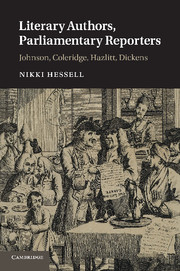Book contents
- Frontmatter
- Contents
- Acknowledgments
- Preface
- Chapter 1 Introduction: reporting and the individual talent
- Chapter 2 Samuel Johnson: beyond Lilliput
- Chapter 3 Samuel Taylor Coleridge and the freedom of the gallery
- Chapter 4 William Hazlitt and the real eloquence of the British Senate
- Chapter 5 Charles Dickens and the ghost of speeches past
- Chapter 6 Conclusion: taking parliamentary reporting seriously
- Bibliography
- Index
Chapter 4 - William Hazlitt and the real eloquence of the British Senate
Published online by Cambridge University Press: 05 November 2011
- Frontmatter
- Contents
- Acknowledgments
- Preface
- Chapter 1 Introduction: reporting and the individual talent
- Chapter 2 Samuel Johnson: beyond Lilliput
- Chapter 3 Samuel Taylor Coleridge and the freedom of the gallery
- Chapter 4 William Hazlitt and the real eloquence of the British Senate
- Chapter 5 Charles Dickens and the ghost of speeches past
- Chapter 6 Conclusion: taking parliamentary reporting seriously
- Bibliography
- Index
Summary
When the words “Hazlitt” and “gallery” are used in the same sentence, one would usually think of William Hazlitt’s visits to the Louvre or his extraordinary art criticism. But Hazlitt was also involved in the affairs of a different kind of gallery. In October 1812, Charles Lamb asked the journalist John Dyer Collier if he would be able to secure Hazlitt some work as a reporter for the Morning Chronicle. The Chronicle’s editor, James Perry, hired Hazlitt a week later to join his paper’s renowned parliamentary corps, which would resume covering the debates when the House met again on November 30. If one wanted to work in the gallery, the Morning Chronicle was the best paper to join; as Hazlitt later recalled, “[f]rom the time of Woodfall, the Morning Chronicle was distinguished by its superior excellence in reporting the proceedings of Parliament.”
Hazlitt thus became part of the highly successful press gallery system that Perry had established in the last decades of the eighteenth century, which he described in an essay for the Edinburgh Review:
At present, several Reporters take the different speeches in succession – (each remaining an hour at a time) – go immediately, and transcribe their notes for the press; and, by this means, all the early part of a debate is actually printed before the last speaker had risen upon his legs. The public read the next day at breakfast-time (perhaps), what would make a hundred octavo pages, every word of which has been spoken, written out, and printed within the last twelve or fourteen hours!
He stayed in this role until at least the end of 1813, by which time he had begun to contribute dramatic criticism and other writing to the Morning Chronicle. The work also left him comfortable financially; Crabb Robinson commented that he had visited Hazlitt “in a handsome room, and his supper was comfortably set out, – enjoyments which have sprung out of an unmeaning chat with Mrs. Clarkson at Lamb’s.”
- Type
- Chapter
- Information
- Literary Authors, Parliamentary ReportersJohnson, Coleridge, Hazlitt, Dickens, pp. 97 - 128Publisher: Cambridge University PressPrint publication year: 2011



